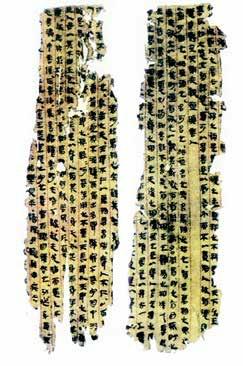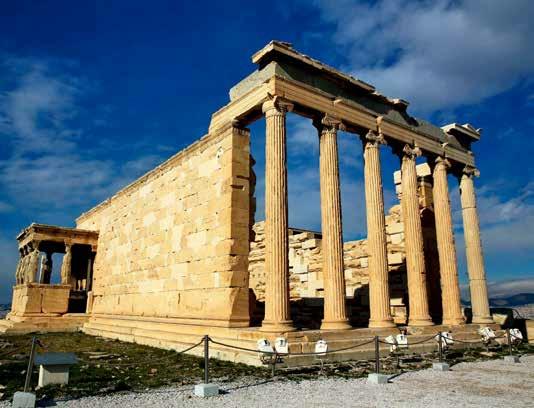Civilizational Evolution
by Pan Yue


Today, China and the West are again poised at a crossroads of reciprocal understanding. The spirit of classical civilization is embedded in modern civilization. America and Europe inherited the genes of ancient Greek and Roman civilizations just as other regions have continued traditions of their own ancestors. Different cultural genes have led every country and region to different development paths.
The political order of modern European and American civilization features a combination of the essences of ancient Greek and Roman civilizations, Christian civilization, and industrial civilization. Ancient Greek civilization is considered the most fundamental source of modern Western civilization. Likewise, the path China has walked in modern times is based on the legacy of ancient Chinese civilization. The form of ancient Chinese civilization was stabilized in the Qin (221-207 B.C.) and Han (202 B.C.-220 A.D.) dynasties, but formative evolution was occurring as early as the Warring States Period(475-221 B.C.)
During the period from the fifth to third century B.C., China faced a historical situation like that of ancient Greece. Both fell into chaos due to internal conflict before eventually reaching a road to unification. In both countries, the positive force driving the unification movement wasnt a kingdom in the core area, but a military power operating on the peripheries of the civilization. Many intellectuals became committed to the cause of unifying the country, and produced extensive philosophical, political, and ethical propositions to that end.
However, unification movements in the two ancient countries brought different results. The Empire of Alexander the Great fell apart only seven years after the unification of ancient Greece, and its three successive kingdoms fought with each other across the subsequent century before being eventually annexed by the Roman Empire. The Qin State unified China by defeating the forces of all other states. Although the Qin Dynasty collapsed 14 years later, another unified empire, the Han Dynasty,emerged in its place. The systems of the Qin and Han dynasties were inherited by subsequent dynasties and passed down across more than 2,000 years.
The different results of similar historical conditions can be credited to contrasting roots of civilization.
A general governance trend during the late Warring States Period combined morals and ethics advocated by Confucianism and punishments advocated by Legalism. “Unity” became a common political pursuit for rulers of all states. None were willing to settle as a mere local regime, and all sought to unify the entire country. There was no disagreement on whether the country should be unified, and players competed against each other to determine the final unifier. Obsession with “unity”was the most prominent characteristic of Chinese politicians in many past dynasties. The same mentality influenced ancient Chinese thinkers and philosophers. Unearthed bamboo and silk documents from the Warring States Period verify that “various schools of thought integrated with each other” at that time. The integration of those philosophical thoughts aimed to build “unified order.” The Warring States Period became a“melting pot” for philosophical ideas. In this sense, the Qin State isnt responsible for unifying the country—it just merged into a unified China.
The unification movement of ancient Greece derived from conflict between city-states. The inheritance from classical Greek civilization most cherished by Westerners today is a small portion of Greek history, namely the golden age of Athenian culture under the leadership of Pericles(495-429 B.C.), an era that brought the greatest achievements of ancient Greek democracy. After that golden age that lasted only several decades, city-states in Greece fell into fierce internal strife. Afterwards, Athens and Sparta alternately dominated Greece. Both brutally massacred residents of the other at various times.
American historian William Scott Ferguson concluded that Greek city-states couldnt be integrated. He likened each Greek city-state to a single-celled organism with unique internal structure. The only way any could evolve is by self-replicating. They could force replication on peers, but those “cells,” whether old or new, could never come together to forge a strong nation-state.
The foundation of Greek city-state politics wasnt democracy but autonomy. A city-state could choose any political system, and would never surrender to any external authority. Only permanent residents of the city-state had the right to determine which political system would be adopted. However, “absolute autonomy”meant “absolute regionalism,”making unification impossible. Greek city-states opposed not only the founding of territorial states, but also the establishment of a federal state with Macedonia. Greek city-states didnt forge a workable federal system until the day they were conquered by the Roman Empire. City-states considered their own interests superior to those of the entire Greek community.
No matter how hard they competed, the seven powers of the Warring States Period and intellectuals from various schools of thought of that time all believed in the same unified order and that the divided state should end quickly. At the same time, Greek city-states lacked a common ruler, and different alliances caused infighting. No one believed in any“unified order.”
According to the rites of the Zhou Dynasty (1046-256 B.C.), if a vassal state was hit by a plague or famine, other vassal states should offer a helping hand, and when a vassal state held major celebratory activities or funerals, other vassal states should send representatives to express congratulations or mourning. Such deeds strengthened the notion that all vassal states belonged to the same “Chinese world.” In contrast, Greek city-states lacked any such binding responsibilities. Even a newly established city-state had no obligations to its parent city-state, and even took measures to highlight its independence. Even during the Greco-Persian Wars, the common identity of Greeks played only a negligible role in uniting the city-states.
The different roots of the two civilizations eventually led to two drastically different paths of development.
China has continuously sought unity between regions, ethnic groups, and languages. Despite several divided periods caused by factors like dynastic collapse and invasion by nomadic tribes, unity remained the mainstream desire throughout history. This has fostered the present collectivism seen in Chinese civilization.
The West has constantly advocated separation between regions, ethnic groups, and languages. The few attempts to unify the Western world such as the efforts of the Roman Empire and Roman Catholic Church have done little to diminish the overall trend of separation that still dominates Western society after leading to individualism and liberalism.

